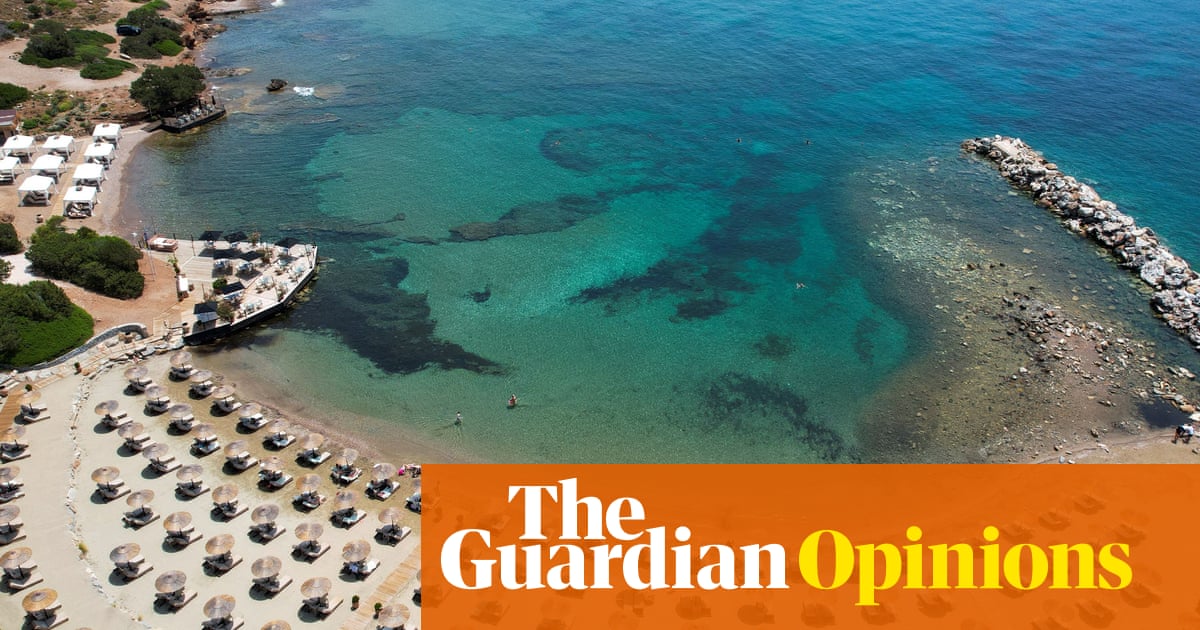Next week, I’m going on an all-inclusive holiday to Greece. All-inclusives have a famously bad rep for all-day boozing, and in certain quarters there is a sniffiness about their supposed chips with everything, Brits abroad vibe. For some people, the idea of being confined to a hotel, even one with a beautiful beach attached, sounds awful. But, like many parents, I’ve become a convert.
How did I get here? I think it was always on the cards. When I was small, holiday brochures were my bibles. I’d spend hours perusing them and comparing the hotels: their azure pools framed by water slides undulating in spaghetti-like nests, their private white-sand beaches with lines of striped parasols, and these things called “kids’ clubs”, which offered all kinds of fun activities and, most excitingly, a disco.
All-inclusives were big in the 90s, at least in my small Welsh community. International travel had become more accessible to working-class families, and they were flocking to Spain and Greece. My classmates would return bronzed, with portions of their hair wrapped in silken, coloured threads of embroidery, their talk of “tapas” and “pesetas” sounding impossibly glamorous. They knew all the big hits before they hit British shores – Saturday Night, Macarena – and the dances to match. I would feel wild with jealousy.
We had never been able to afford an all-inclusive, but in my mid-teens I went on a couple of package deals and had the best time: finally, I got to swim in a sea so clear you could see the bottom! I did karaoke and went parasailing and – despite a teenage pregnancy scare that hung over a mother-daughter trip to Zakynthos until I finally, jubilantly got my period on a tour boat to Navagio beach – I fell desperately in love with Greece.
I didn’t really realise there was a snobbery about package holidays until I started university and met people who had grown up with second homes or who took expensive gap years, prattling on about all the remote places they had seen, how they’d slummed it in a beach shack (before recuperating in a five-star hotel, of course). I guess I bought into it to an extent, because I spent my 20s trying to get to the most remote and underpopulated Greek islands possible.
The one all-inclusive I experienced at that time was in Cuba, as it was the only accommodation available near a particular beach. It was full of Canadians who had brought their own drinking receptacles because the hotel’s plastic cups didn’t hold enough piña colada. To quote The Lazy River, Zadie Smith’s all-inclusive-set short story, they were drinking “so much alcohol that your accommodation is effectively free”. One night, the “entertainment” was a monkey riding a donkey, though I could have been hallucinating because of all the rum.
It was only when I became a parent that I fully appreciated the sheer joy of the all-inclusive. After my son was born prematurely, and in his first year needed some hospital treatment, I didn’t want to take him to a place where the only way out was a twice-weekly boat, where there was no doctor, or even a pharmacy. I had certainly become a more anxious traveller, but also I was knackered. I didn’t want to cook. I didn’t want to have to plan. I wanted a holiday, but I wanted it to be easy.
This generation of parents is the most well-travelled in human history, their tastes have been refined, and I found that a lot of all-inclusives have upped their game. Ikos, especially, is now the word on a certain kind of British parent’s lips. With its gourmet cuisines (including gourmet baby food), creches following Ofsted guidelines and incredible service (they literally take your baby’s bottles away, sanitise them and bring them back to your room), its resorts are a world away from the sorts of all-inclusives I lusted after as a child. We were only ever able to holiday with them once, in Halkidiki, thanks to my selling my novel, getting a really good deal on the trip, having a child under two and booking at a time when it was more likely to rain (which it did) – but we were the most relaxed I think it’s possible to be on holiday with a baby, and if I ever get a windfall I will totally be back.
Thankfully, you don’t have to pay those prices for a great all-inclusive experience. I love Grecotel, the more affordable Greek chain, because the mostly Mediterranean food is excellent and it’s very kid-friendly (last year, at their hotel on Corfu, my son got to experience a water slide for the first time, and it felt as if I had come full circle and achieved my childhood dreams). Part of the reason that I can’t stand snobbery about all-inclusive hotels is because lots of them are more and more accessible, not only to those with small children but to disabled people. In many places you can hire mobility scooters, wheelchairs and buggies.
One of the reasons we didn’t travel much when I was growing up was because of my brother’s complex needs. It was a different world back then, a fact that hit me last year as I stood in the check-in queue at Corfu airport and noted big advertising screens proudly displaying their “Boarding pass for autism”. Suddenly, I was wiping away tears. On returning, I discovered that Tui is now advertising “neuro-inclusive” holidays. Some of its hotels now have sensory rooms, and its childcare staff are trained in special educational needs.
These things matter to families. At a time when parents are stressed, skint, overworked and often isolated, an all-inclusive is a pressure-off option. Don’t knock it until you’ve tried it. Personally, I’d take one over a campsite in France any day.
Rhiannon Lucy Cosslett is a Guardian columnist
